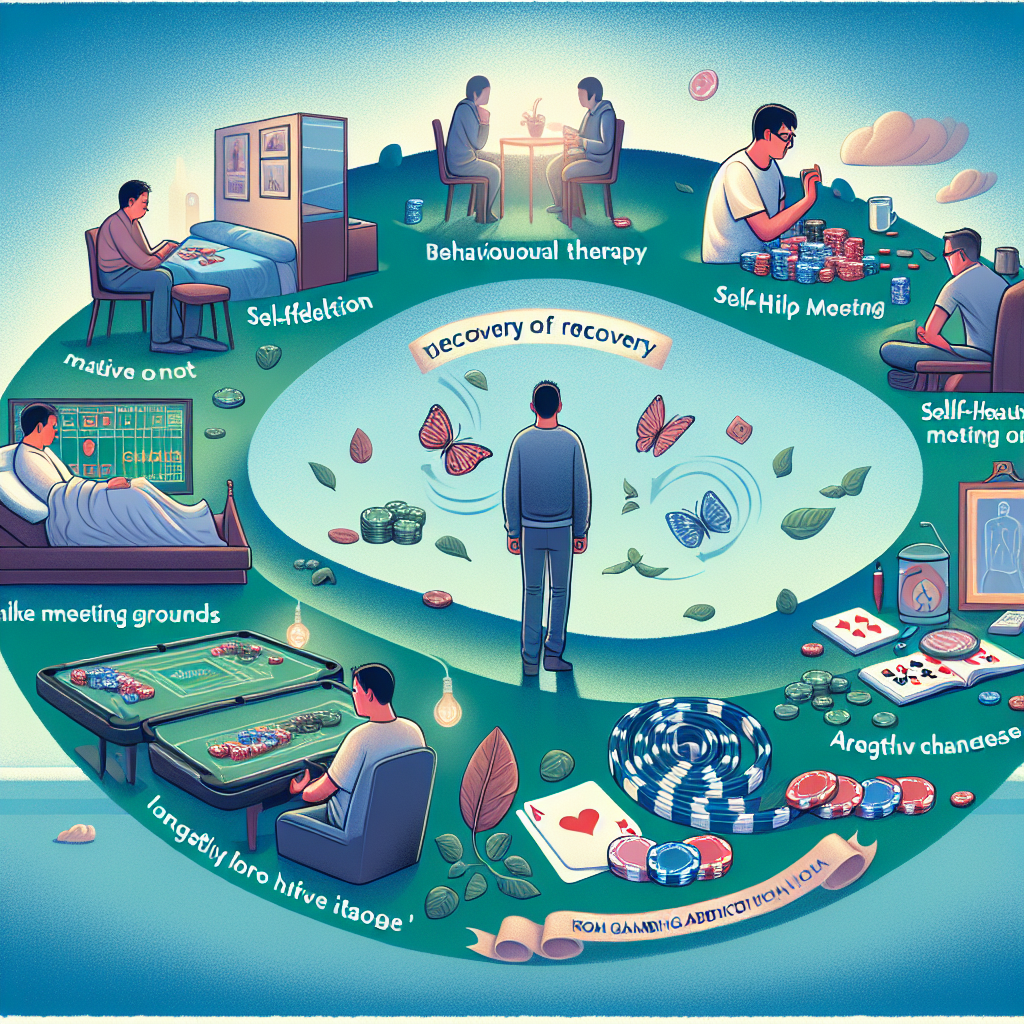-
Table of Contents

“Rebuilding Minds: Navigating the Psychological Pathways to Overcome Gambling Addiction.”
Introduction
Gambling addiction recovery involves addressing various psychological aspects to achieve long-term success. Key psychological components include understanding the underlying emotional triggers that lead to compulsive gambling, such as stress, depression, or anxiety. Cognitive-behavioral therapy (CBT) is often employed to help individuals recognize and change distorted thinking patterns and behaviors associated with gambling. Building emotional resilience and developing healthy coping mechanisms are crucial for managing urges and preventing relapse. Additionally, fostering a strong support system through group therapy or support groups can provide emotional reinforcement and accountability. Addressing co-occurring mental health disorders, such as substance abuse or mood disorders, is also essential for comprehensive recovery. Overall, a multifaceted approach that combines therapy, support, and self-awareness is vital for overcoming gambling addiction.
Understanding The Emotional Rollercoaster In Gambling Addiction Recovery
Gambling addiction recovery is a journey fraught with emotional highs and lows, a true rollercoaster that tests the resilience and determination of those affected. Understanding the psychological aspects of this recovery process is crucial for both the individuals battling the addiction and their support networks. The emotional landscape of gambling addiction recovery is complex, involving a myriad of feelings that can range from hope and relief to despair and frustration. Recognizing and addressing these emotions is essential for a successful recovery.
Initially, the decision to seek help often comes with a sense of relief and hope. Admitting the problem and taking the first step towards recovery can be empowering. However, this initial optimism can quickly be overshadowed by feelings of guilt and shame. Many individuals struggle with the realization of the extent of their addiction and the impact it has had on their lives and the lives of their loved ones. These feelings can be overwhelming, but they are a natural part of the healing process. It is important to acknowledge these emotions rather than suppress them, as doing so can lead to further psychological distress.
As the recovery process continues, individuals often experience a sense of loss. Gambling may have been a significant part of their lives, providing not only a source of excitement but also a way to cope with stress and other negative emotions. The absence of gambling can leave a void, leading to feelings of emptiness and boredom. This is where developing new, healthy coping mechanisms becomes crucial. Engaging in activities that bring joy and fulfillment can help fill this void and provide a positive outlet for emotions.
Another significant psychological aspect of gambling addiction recovery is dealing with triggers and cravings. These can be powerful and persistent, often arising unexpectedly and challenging an individual’s resolve. Learning to recognize and manage these triggers is a key component of recovery. Cognitive-behavioral therapy (CBT) is one effective approach that helps individuals identify the thoughts and behaviors that lead to gambling and develop strategies to change them. Mindfulness and stress-reduction techniques can also be beneficial in managing cravings and maintaining emotional balance.
Support from family, friends, and support groups plays a vital role in the recovery process. Feeling understood and supported can make a significant difference in an individual’s ability to stay committed to their recovery. However, relationships may also be a source of stress, especially if there has been a history of deceit or financial strain due to the addiction. Rebuilding trust takes time and effort, and open, honest communication is essential. Family therapy can be a valuable tool in addressing these issues and fostering a supportive environment.
Throughout the recovery journey, it is important to celebrate small victories and milestones. Progress may be slow, and setbacks are common, but each step forward is a testament to an individual’s strength and determination. Maintaining a positive outlook and focusing on the progress made rather than the distance still to go can help sustain motivation.
In conclusion, the emotional rollercoaster of gambling addiction recovery is a challenging but navigable journey. By understanding and addressing the psychological aspects of recovery, individuals can develop the resilience and coping strategies needed to overcome their addiction. With the right support and a commitment to personal growth, it is possible to reclaim a life free from the grip of gambling addiction, paving the way for a healthier, more fulfilling future.
The Role Of Cognitive Behavioral Therapy In Overcoming Gambling Addiction
Cognitive Behavioral Therapy (CBT) has emerged as a cornerstone in the treatment of gambling addiction, offering a structured and effective approach to overcoming this pervasive issue. Gambling addiction, much like other forms of addiction, is not merely a matter of willpower; it is a complex interplay of psychological, emotional, and behavioral factors. Understanding the role of CBT in this context can provide hope and a clear path forward for those struggling with gambling addiction.
At its core, CBT focuses on identifying and altering the negative thought patterns and behaviors that contribute to addictive behaviors. For individuals grappling with gambling addiction, these thought patterns often include irrational beliefs about luck, probability, and control. For instance, a common cognitive distortion among gamblers is the “gambler’s fallacy,” the erroneous belief that past events can influence future outcomes in games of chance. By addressing these misconceptions, CBT helps individuals develop a more realistic understanding of gambling and its consequences.
Moreover, CBT emphasizes the importance of self-awareness and self-monitoring. Through various techniques, individuals learn to recognize the triggers and situations that lead to gambling urges. This heightened awareness is crucial because it allows individuals to intervene early in the cycle of addiction, employing coping strategies before the urge to gamble becomes overwhelming. Techniques such as journaling, mindfulness, and stress management are often incorporated into CBT to enhance self-awareness and emotional regulation.
Another significant aspect of CBT in gambling addiction recovery is the focus on developing healthier coping mechanisms. Many individuals turn to gambling as a way to escape from stress, anxiety, or other negative emotions. CBT helps individuals identify these underlying emotional issues and teaches them alternative ways to cope. For example, instead of turning to gambling to alleviate stress, individuals might learn to engage in physical exercise, seek social support, or practice relaxation techniques. By replacing harmful behaviors with positive ones, individuals can gradually break free from the cycle of addiction.
Furthermore, CBT often involves setting realistic and achievable goals. This goal-setting process is empowering because it provides individuals with a sense of direction and purpose. Small, incremental goals can lead to significant progress over time, fostering a sense of accomplishment and boosting self-esteem. For instance, an individual might start by setting a goal to avoid gambling for one day, then gradually increase the duration as they build confidence and resilience.
In addition to individual therapy, CBT can also be effective in group settings. Group therapy provides a supportive environment where individuals can share their experiences, learn from others, and receive encouragement. The sense of community and shared understanding in group therapy can be incredibly motivating, helping individuals feel less isolated in their struggles.
The success of CBT in treating gambling addiction is well-documented, with numerous studies highlighting its efficacy. However, it is important to recognize that recovery is a journey, and setbacks are a natural part of the process. CBT equips individuals with the tools to navigate these challenges, fostering a mindset of resilience and perseverance. By continuously applying the principles of CBT, individuals can maintain their progress and build a fulfilling, addiction-free life.
In conclusion, Cognitive Behavioral Therapy plays a pivotal role in overcoming gambling addiction by addressing the underlying cognitive distortions, enhancing self-awareness, developing healthier coping mechanisms, and setting achievable goals. Through this structured and supportive approach, individuals can break free from the grip of gambling addiction and embark on a path toward lasting recovery. The journey may be challenging, but with the right tools and support, it is entirely possible to reclaim one’s life and achieve a brighter future.
Q&A
1. **Question:** What role does cognitive-behavioral therapy (CBT) play in gambling addiction recovery?
**Answer:** Cognitive-behavioral therapy (CBT) helps individuals identify and change distorted thought patterns and behaviors related to gambling, teaching coping strategies and problem-solving skills to manage triggers and prevent relapse.
2. **Question:** How important is social support in the recovery process from gambling addiction?
**Answer:** Social support is crucial in gambling addiction recovery as it provides emotional encouragement, accountability, and a sense of community, which can significantly reduce feelings of isolation and help maintain long-term abstinence.
Conclusion
The psychological aspects of gambling addiction recovery involve addressing underlying mental health issues, developing coping strategies, and fostering behavioral changes. Key components include cognitive-behavioral therapy to reframe negative thought patterns, support groups for shared experiences and accountability, and stress management techniques to handle triggers. Emotional regulation and building a strong support network are also crucial. Recovery often requires a holistic approach that integrates psychological, social, and sometimes pharmacological interventions to achieve long-term success.



